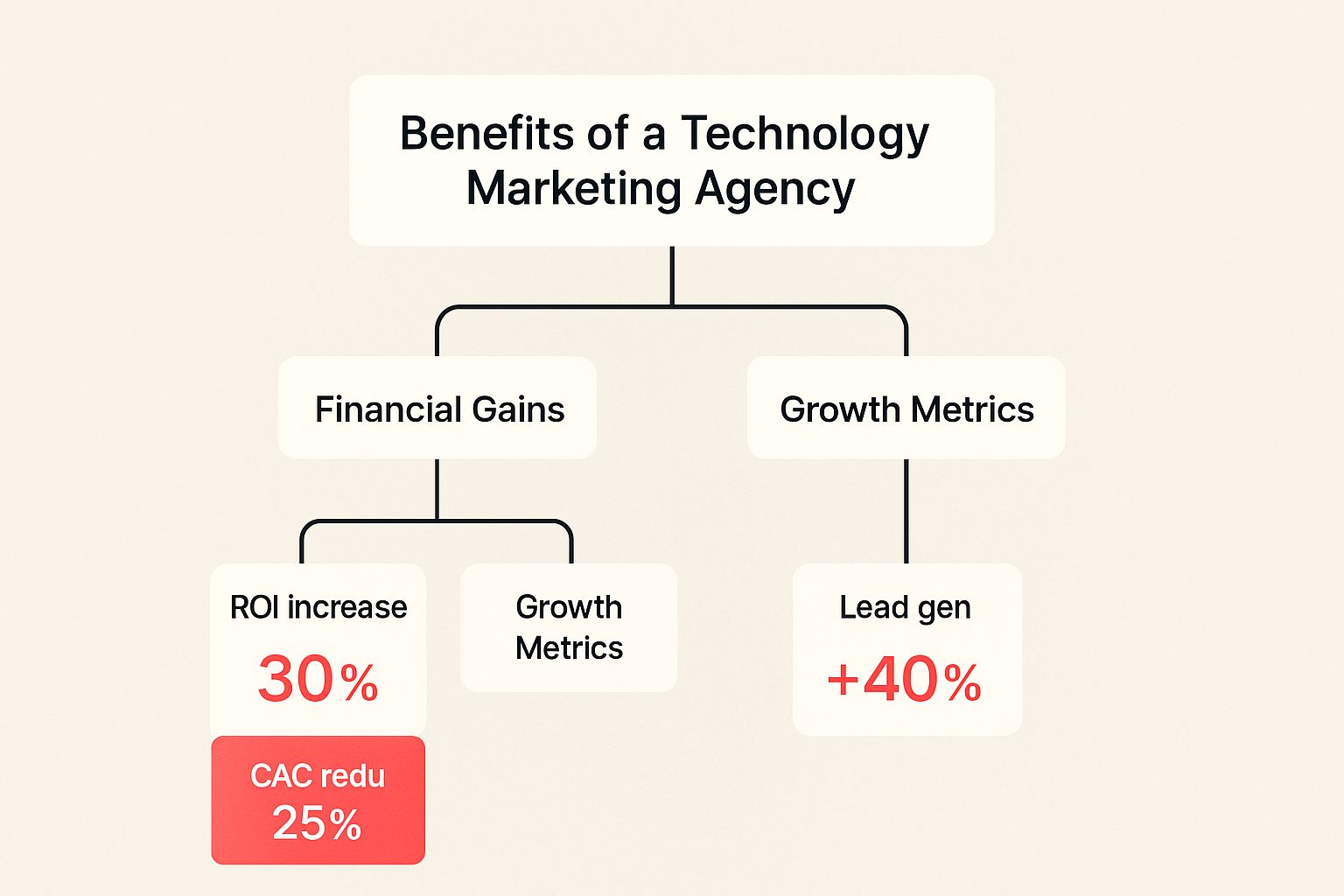Top Technology Marketing Agency for Your UK Tech Growth
So, what exactly is a technology marketing agency? Put simply, it’s a specialised partner that gets the intricate world of sectors like SaaS, FinTech, or Deep Tech. Unlike a generalist firm, they bring profound industry knowledge to the table.
This allows them to craft marketing strategies that truly connect with savvy technical audiences and navigate those notoriously complex sales cycles, ultimately sparking real growth for your tech business.
What Defines a Technology Marketing Agency

Think of it like hiring a builder. If you’re building a standard house, any good general contractor will do. But if you’re constructing a high-spec laboratory? You need an architect who understands sterile environments, complex equipment, and specific regulations. A technology marketing agency is that specialist architect for your business.
Generalist marketing often misses the mark in the tech world. It can fail to grasp the nuances of the product and, more importantly, the people who buy it. A specialised agency, on the other hand, already speaks your industry’s language fluently.
This expertise is absolutely vital for turning complex features into compelling benefits that resonate with engineers, CTOs, and other technical decision-makers.
The Specialist Advantage
The real game-changer is this deep, sector-specific expertise. A specialist partner does not need a crash course on the basics of your industry. They walk in with a solid understanding of your market, your competitors, and your customers' biggest headaches.
This insight means they can get straight to work:
- Articulating Complex Value: They know how to clearly communicate the way your software, hardware, or service solves specific, high-stakes problems for other businesses.
- Navigating Long Sales Cycles: They can build strategies that nurture leads over several months, building trust and demonstrating value at every single touchpoint.
- Targeting Niche Audiences: They have the know-how to accurately find and engage the right people within a target organisation, from the everyday user to the C-suite.
To get a better feel for what these firms do day-to-day, exploring Ad Reform's use cases for agencies can offer some valuable real-world examples.
A true technology marketing agency acts as a strategic growth partner, not just a service provider. Their goal is to integrate deeply with your team to drive measurable business outcomes, such as increased market penetration and superior lead quality.
This focused approach is more important than ever in such a competitive space. The UK's digital marketing industry is thriving, with a projected growth of 6.3% CAGR between 2022 and 2027. Specialised agencies are leading the charge, with an incredible 94% of UK digital marketers already using AI to sharpen their campaigns.
For businesses keen to see what these advanced services look like in practice, you can get a clearer picture of the possibilities here: https://www.superhub.biz/what_we_do_at_superhub_digital_media_marketing. In the end, these agencies are essential for helping tech companies rise above the noise and succeed.
What a Tech Marketing Agency Actually Does to Grow Your Business
A proper technology marketing agency does a lot more than just run a few digital ads. Their services are built from the ground up to tackle the unique hurdles of selling complex tech – whether that’s breaking into a new market or carefully winning over major enterprise clients. Think of them as the engine room for sustainable growth.
It all starts with getting to grips with the product itself. They have the knack for translating dense technical specs into clear, compelling benefits that actually mean something to the right people. This translation work is the foundation for everything that follows.
This image really drives home the tangible results a specialised agency can bring, showing clear improvements across the board, from financial returns to essential growth metrics.

As you can see, the impact is not trivial. We're talking about significant boosts in ROI and lead generation, all while bringing down the cost of acquiring each new customer.
Getting the Strategy Right First
Before a single penny is spent on advertising, the strategic groundwork has to be perfect. A specialist agency makes its mark by building this foundation, making sure every marketing move is directly tied to the company's biggest goals right from the start.
Here’s what that looks like in practice:
- Product Marketing: This is all about carving out the product's space in the market. It involves pinpointing its unique selling proposition (USP) and crafting core messages that speak directly to the frustrations and needs of the target audience.
- Go-to-Market (GTM) Strategy: This is the master plan for launching a new product or expanding into a new territory. It covers absolutely everything, from pricing models and sales channels to the specific marketing tactics needed to build momentum and get people on board.
Getting these initial steps right is non-negotiable. A wobbly GTM strategy can sink even the most brilliant piece of tech before it has a chance to shine.
Pinpoint Targeting to Find the Right Buyers
Once the strategy is locked in, it’s time to execute. This is where a technology marketing agency brings out the big guns, using sophisticated tactics to attract and convert the right kind of customers – often those working within very specific, high-value companies.
You can think of Account-Based Marketing (ABM) as a kind of diplomatic mission for your most wanted clients. Instead of spraying your message everywhere and hoping for the best, ABM concentrates all marketing and sales efforts on a handpicked list of target accounts, treating each one like its own mini-market.
This laser-focused approach works wonders in B2B tech, where buying decisions are often made by a whole committee and sales cycles can drag on for months. It’s often paired with a highly specialised version of B2B search engine optimisation. To get a better handle on this, feel free to check out our in-depth guide on SEO services .
The table below shows just how different the approach is when you compare a generalist agency with a tech-focused one.
Traditional Marketing vs Technology Marketing Services
| Marketing Service | Traditional Agency Focus | Technology Agency Focus |
|---|---|---|
| Content Marketing | Broad appeal, general topics, brand awareness. | Technical white papers, in-depth case studies, solution-oriented blog posts targeting specific user personas. |
| Paid Advertising | Clicks and impressions across wide demographic segments. | Highly targeted campaigns on platforms like LinkedIn, focusing on specific job titles, industries, and company sizes. |
| SEO | High-volume, general keywords to drive traffic. | Niche, long-tail keywords that capture high-intent technical queries and address specific user problems. |
This fine-tuned focus means every marketing pound is put to work attracting qualified leads who are genuinely looking for a complex tech solution like yours. It’s this very distinction that separates a generic agency from a true growth partner.
The Strategic Benefits of a Specialist Agency Partnership

Bringing a specialist partner on board gives you a whole lot more than just an extra pair of hands for marketing tasks. The real win comes from the concrete business results they drive. They quickly move beyond being just another vendor and become a core part of your growth strategy, using their deep industry knowledge to give your entire go-to-market plan a serious boost.
One of the biggest advantages you'll see is accelerated market penetration . Think about it: a general agency might spend months just getting their head around your industry's quirks. A technology marketing agency , on the other hand, can hit the ground running. They already get the competitive landscape, know the main players, and understand the precise problems your product solves. That means effective campaigns right from day one.
This inside knowledge also has a direct impact on lead quality. Instead of casting a wide, expensive net and hoping for the best, they zero in on prospects who genuinely need what you're offering. Research has shown that companies with tightly aligned sales and marketing teams enjoy up to 36% higher customer retention rates . A specialist agency is perfectly placed to create that alignment because they start with a crystal-clear picture of who your ideal customer really is.
The Power of Industry Context
To really get why this specialisation matters, imagine trying to market two completely different products. Let's say one is a fun lifestyle app for the general public, and the other is a highly complex piece of B2B enterprise software for the finance sector.
A generalist agency might throw the same playbook at both – probably something heavy on broad social media campaigns and influencer shout-outs. That strategy could be great for the lifestyle app, but it would be a spectacular waste of money for the enterprise software.
A specialist agency knows that selling sophisticated B2B tech is not about going viral. It’s about methodically building credibility, proving deep technical value, and carefully nurturing relationships with key decision-makers over what is often a very long sales cycle.
For the enterprise software, their approach would be completely different:
- Content: Forget snappy social posts. They’d be crafting in-depth white papers on regulatory compliance and creating detailed case studies that show tangible ROI for other financial firms.
- Targeting: Their campaigns would be surgically precise, running on platforms like LinkedIn to reach specific job titles like 'Head of IT' or 'Chief Compliance Officer' at a curated list of target banks.
- Messaging: The language would be specific and technical. It would speak directly to high-stakes business challenges, from data security to operational efficiency.
From Service Provider to Strategic Partner
This kind of focused approach is exactly how a specialist's industry expertise translates into more effective marketing. They can explain your complex value proposition with a clarity that a generalist just cannot replicate. And in the tech world, that clarity is vital for earning the trust of a smart, often sceptical, technical audience.
When all is said and done, this expertise delivers a far better return on your investment. Your marketing budget is not squandered on the wrong channels or unqualified leads. Instead, every single pound is put to work attracting, engaging, and converting the right kind of customers—the ones who will actually grow your business and cement your agency's place as a vital part of your journey.
How Top Agencies Use AI in Their Marketing Playbook
Artificial intelligence has quickly moved from a buzzword to a core part of the toolkit for any serious technology marketing agency . It's not about replacing human expertise with robots; instead, think of AI as a strategic co-pilot. It gives marketers the power to make smarter, faster decisions by crunching massive datasets that would be impossible to handle manually.
A human strategist might be able to spot trends across a few hundred data points. An AI, on the other hand, can sift through millions in a heartbeat. This gives a savvy agency the ability to find hidden patterns, get a real sense of future customer behaviour, and personalise marketing messages at a scale we could only dream of a few years ago.
This is not just about doing the same old tasks a bit faster. It's about opening up entirely new ways to approach marketing strategy.
From Simple Automation to Genuine Insight
The real magic of AI in marketing is its knack for unearthing deep, actionable insights. The best agencies have moved well beyond using it for basic tasks like scheduling social media posts. They're now pointing AI at their clients' biggest strategic hurdles to carve out a real competitive edge.
Here are a few ways this plays out in the real world:
- Smarter Lead Scoring: AI algorithms can chew through past customer data to build a crystal-clear picture of what a high-value lead looks like. This means the sales team can stop guessing and focus their time on prospects who are actually likely to buy.
- Deep Content Personalisation: Imagine if your website or email campaigns could show something slightly different to every single visitor. AI makes that a reality, dynamically changing content based on a user’s browsing behaviour, location, and previous interactions with the brand.
- Real-Time Campaign Optimisation: Instead of waiting weeks for a report, AI can watch how dozens of marketing channels are performing right now. It can then automatically shift budget to the channels delivering the best results, squeezing every last drop of value from the marketing spend.
These advanced techniques show just how artificial intelligence is revolutionising digital marketing. It’s about moving away from gut feelings and towards decisions backed by solid data.
AI is not here to replace skilled marketers. It's here to supercharge them. It handles the repetitive, data-heavy lifting, freeing up human experts to focus on what they do best: strategy, creativity, and building real relationships.
Keeping Pace in an AI-Driven World
Businesses across the UK are catching on. Recent survey data reveals that around 51% of UK businesses have set aside dedicated budgets for AI technologies in 2025. Confidence is also growing, with 71% of businesses saying they trust AI more now than they did a year ago.
This is not a passing trend; it's a fundamental shift in how business is done. For a modern technology marketing agency, simply understanding AI is not enough anymore. They need to have mastered its application to deliver the kind of strategic value and measurable growth that clients now demand. It's the new benchmark for success.
How to Select the Right Agency for Your Business

Choosing a marketing agency is not like picking a supplier off a list. It’s much more like hiring a senior member of your team—someone who will be at the heart of your growth. That’s why the decision has to be a thoughtful one.
You need to find a technology marketing agency that goes beyond just offering services. You’re looking for a partner that genuinely gets your vision, your product, and the market you’re trying to capture.
This means you’ve got to look past the flashy websites and bold claims. The real test is finding an agency with a proven track record in the tech world. They need to have walked this path before, whether that means navigating a complex B2B sales funnel or making a niche software solution feel essential.
For many businesses starting this search, getting a grasp on how to choose a creative agency is a fantastic starting point. The core principles—vetting for genuine expertise, checking for cultural fit, and demanding proven results—are exactly what you need here.
Assessing Industry Specialisation and Experience
A great portfolio is one thing, but a portfolio packed with tech companies like yours? That’s the gold standard. You need to see tangible proof that they understand your world.
Dive deep into their case studies. Look for client testimonials that speak to real, measurable results they’ve delivered for businesses in SaaS, FinTech, or whatever your particular tech vertical happens to be.
When you get them on a call, do not be afraid to put their knowledge to the test. Ask very specific questions about the challenges your market faces. An agency that can talk fluently about the nuances of your industry is one that can hit the ground running, saving you weeks of hand-holding.
Think of it this way: the right agency should feel like an extension of your own team. Look for a natural alignment. Do they communicate in a way that gels with your company culture? Do their values and work ethic mirror yours? A strong partnership is built on more than just skill; it requires real collaboration and mutual respect.
This is more important than ever. The UK technology marketing scene is buzzing, and investors are taking notice. In the first quarter of 2024 alone, there were 85 mergers and acquisitions in the UK's media and marketing services sectors. A full quarter of those deals involved tech-focused marketing firms, signalling a big push towards consolidation and specialisation.
Key Questions to Ask Potential Partners
To avoid getting swept up in a slick sales pitch, go into your meetings prepared. Having a checklist of questions helps you compare agencies on a level playing field and get the answers you actually need to make a solid decision.
Here are a few essential questions to get you started:
- How would you measure success for a product like ours? Their answer should be about business outcomes—think lead quality, customer acquisition cost, and sales pipeline growth—not just vanity metrics like website traffic.
- Can you walk me through a go-to-market strategy you built for a similar tech company? This question peels back the curtain on their strategic thinking and how they turn a plan into action.
- What does your process for client communication and reporting look like? You're listening for transparency and a clear, regular rhythm for updates.
- Who from your team would be hands-on with our account? It's vital to know the experience level of the people doing the day-to-day work, not just the senior partners who wooed you in the pitch meeting.
By asking these kinds of direct questions, you can slice through the marketing jargon and find a true strategic partner—one that’s ready to deliver the results your tech business needs.
A Few Common Questions About Tech Marketing Agencies
Deciding to bring in a specialist partner is a big step, and it’s natural to have questions. When you're thinking about hiring a technology marketing agency , you'll want to get into the nuts and bolts of it all – the costs, the timelines, and how you’ll know if your investment is actually paying off.
Getting straight answers to these questions is crucial. It’s all about setting realistic expectations from the get-go and making sure you and your potential agency are on the same page about what success really looks like for your business.
How Much Does it Cost to Hire an Agency?
There's no single price tag for a technology marketing agency. The cost really depends on what you need and how involved you want them to be. Think of it less like buying a product and more like building a partnership.
Most agencies have a couple of common ways they structure their fees:
- Monthly Retainers: This is the go-to model for ongoing work. If you need consistent support with things like SEO, content creation, or social media, a monthly retainer keeps the engine running. It basically makes the agency a dedicated part of your team.
- Project-Based Fees: Have you got a specific, one-time goal in mind? Maybe a product launch or a complete website overhaul? A fixed project fee is perfect for this. You get a clear price for a very specific outcome.
Any good agency will be completely transparent about their pricing, making sure every pound you spend is tied directly to your business goals.
How Long Until I See Results?
This is the big one, and the honest answer is: it takes time. While some marketing tactics can give you a quick jolt of activity, building real, sustainable growth is a marathon, not a sprint.
It’s vital to understand that marketing is not an overnight fix. Paid advertising can bring in leads within weeks, which is great for a quick win. But the powerhouse organic strategies, like SEO and content marketing, are a long-term play. You're typically looking at six to twelve months before you start seeing a really significant return.
A trustworthy agency will be upfront about this. They should lay out a clear roadmap with milestones along the way, so you can see progress and understand the value they’re creating at every stage.
What's the Difference Between a Tech Agency and a General B2B Agency?
The difference is night and day, and it all comes down to deep-seated industry knowledge. A general B2B agency knows how to sell to businesses, and that's great. But a technology marketing agency lives and breathes your world.
This specialisation means they just get it. They understand your complex products, they know the sales cycles are long and winding, and they know how to talk to technical buyers like a CTO or a lead engineer. That inside knowledge lets them build strategies with a level of nuance a generalist firm simply cannot match.
How Do I Measure the ROI From an Agency?
Measuring the return on your investment (ROI) should not be a mystery. A good agency will sit down with you before a single piece of work is done to define your Key Performance Indicators (KPIs).
And we're not talking about vanity metrics here. We're talking about the numbers that actually impact your bottom line. Success is measured by tracking things like:
- Marketing Qualified Leads (MQLs): How many high-quality leads are coming through the door?
- Customer Acquisition Cost (CAC): What does it actually cost you to land a new customer?
- Conversion Rates: What percentage of those leads are turning into paying customers?
- Sales Pipeline Value: What's the total value of new business driven by marketing?
Keeping a close eye on these KPIs gives you a crystal-clear, data-backed view of the impact the agency is having.
Ready to see how a specialist agency can drive real growth for your tech business? The expert team at Superhub is here to build the marketing strategies you need to succeed. Find out more about how we help tech companies grow.
Want This Done For You?
SuperHub helps UK brands with video, content, SEO and social media that actually drives revenue. No vanity metrics. No bullshit.



